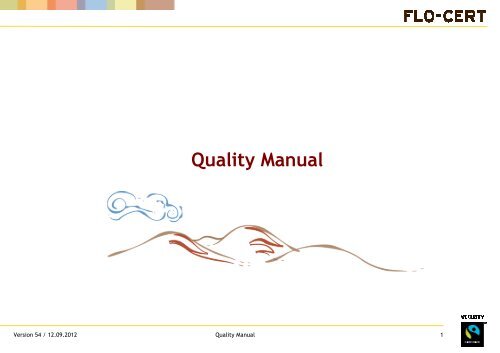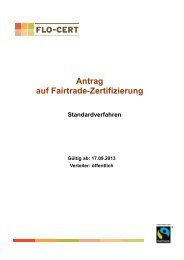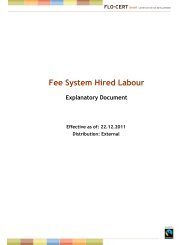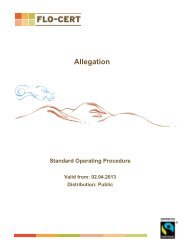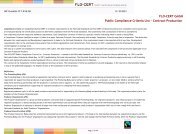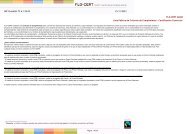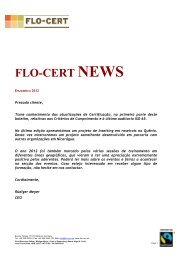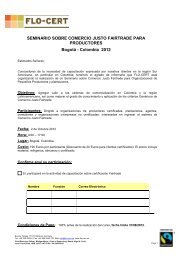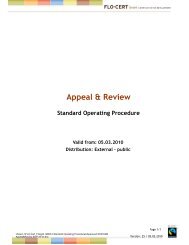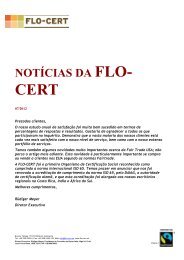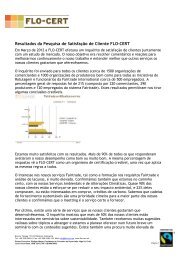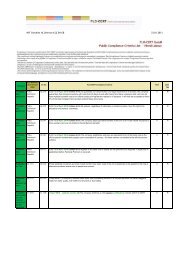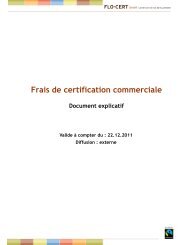Download Quality Manual - FLO-CERT GmbH
Download Quality Manual - FLO-CERT GmbH
Download Quality Manual - FLO-CERT GmbH
You also want an ePaper? Increase the reach of your titles
YUMPU automatically turns print PDFs into web optimized ePapers that Google loves.
<strong>Quality</strong> <strong>Manual</strong><br />
Version 54 / 12.09.2012 <strong>Quality</strong> <strong>Manual</strong> 1
Table of Contents<br />
1 Welcome to Fairtrade Certification ................................ 3<br />
1.1 What is Fairtrade Certification? ................................ 4<br />
1.2 How are <strong>FLO</strong>-<strong>CERT</strong>’s keywords defined? ...................... 5<br />
1.2.1 What are Fairtrade Standards? ............................... 5<br />
1.2.2 What are <strong>FLO</strong>-<strong>CERT</strong> Compliance Criteria? .................. 5<br />
1.2.3 Who are Operators? ............................................ 6<br />
1.3 What is the scope of our certification? ........................ 6<br />
1.3.1 Product scope .................................................. 6<br />
1.3.2 Setups ........................................................... 7<br />
1.3.3 Geographical area ............................................. 8<br />
2 Who are we? ........................................................... 9<br />
2.1 What is our Vision and Mission? ................................. 9<br />
2.1.1 Vision ............................................................ 9<br />
2.1.2 Mission ........................................................... 9<br />
2.2 What is our <strong>Quality</strong> Policy? ...................................... 9<br />
2.3 How is <strong>FLO</strong>-<strong>CERT</strong> incorporated in the Fairtrade setup? .... 10<br />
2.3.1 <strong>FLO</strong> Board ...................................................... 10<br />
2.3.2 Fairtrade International (<strong>FLO</strong>) ............................... 10<br />
2.3.3 Producer Networks ........................................... 11<br />
2.3.4 Labelling Initiatives (LIs)..................................... 12<br />
2.4 How is <strong>FLO</strong>-<strong>CERT</strong> <strong>GmbH</strong> setup? ................................ 12<br />
2.4.1 Legal Status and Headquarters ............................. 12<br />
2.4.2 <strong>FLO</strong>-<strong>CERT</strong> funding ............................................. 12<br />
2.4.3 Organizational Structure ..................................... 12<br />
2.4.4 Roles and Responsibilities ................................... 14<br />
2.4.5 Subcontracting ................................................ 14<br />
2.5 How does <strong>FLO</strong>-<strong>CERT</strong>’s Governance Structure look like? .... 15<br />
2.5.1 The Senior Management Team .............................. 15<br />
2.5.2 The Supervisory Board ....................................... 15<br />
2.5.3 The Finance Committee ..................................... 15<br />
2.5.4 The Appeals Committee ..................................... 18<br />
2.5.5 The Review Committee ...................................... 18<br />
2.6 Who are <strong>FLO</strong>-<strong>CERT</strong>’s Actors? ................................... 19<br />
2.6.1 The <strong>Quality</strong> Management Representative ................. 19<br />
2.6.2 The Team ...................................................... 19<br />
2.6.3 The Auditors ................................................... 19<br />
3 What we do and how we do it? .................................... 20<br />
3.1 How is the certification process setup? ...................... 21<br />
3.2 What are the Certification Cycles? ............................ 21<br />
3.2.1 Three-year certification cycle .............................. 21<br />
3.2.2 Six-year certification cycle for small Licensees .......... 22<br />
3.2.3 Requirements for Small Producer Organizations ......... 19<br />
3.3 What is the <strong>Quality</strong> Management System? ................... 20<br />
3.3.1 Document and Record Control .............................. 20<br />
3.3.2 Document Structure and Purpose of QM documents ..... 21<br />
3.3.3 QMS Non-conformities ........................................ 22<br />
3.3.4 Internal Audits ................................................ 22<br />
3.3.5 <strong>Quality</strong> Checks ................................................ 22<br />
3.3.6 Appeals, Reviews, Complaints and Allegations ........... 22<br />
3.3.7 Management Reviews ........................................ 23<br />
3.3.8 Confidentiality ................................................ 23<br />
3.3.9 Certificate Control ............................................ 23<br />
3.3.10 Publications .................................................... 24<br />
3.4 What is ISO 65 Accreditation?.....................................24<br />
<strong>Quality</strong> Policy ............................................................. 25<br />
Version 54 / 12.09.2012 <strong>Quality</strong> <strong>Manual</strong> 2
1 Welcome to Fairtrade Certification<br />
“Fair Trade is a trading partnership, based on dialogue, transparency and respect, that seeks greater equity in international<br />
trade. It contributes to sustainable development by offering better trading conditions to, and securing the rights of, marginalized<br />
producers and workers – especially in the South. Fair Trade Organizations, backed by consumers, are engaged actively in<br />
supporting producers, awareness raising and in campaigning for changes in the rules and practice of conventional international<br />
trade. Fair Trade products are produced and traded in accordance with these principles - wherever possible verified by credible,<br />
independent assurance systems.” FINE, 2006<br />
History…<br />
In the 1960s many different initiatives around the world started to develop goals and strategies to support small farmers and<br />
workers in the global south in line with economical principles following the concept “Trade not Aid”. They focused on elements<br />
such as the elimination of middlemen, implementation of minimum prices and trade standards, including ethically acceptable<br />
working conditions. After having started with a product palette of handcrafts in so called Worldshops the product portfolio got<br />
extended to food products in order to offer Fair Trade products on an every day basis to the consumer, therefore broaden the<br />
movement and put it on a more solid basis.<br />
History of Fairtrade International (<strong>FLO</strong>)…<br />
In 1992 about 10 national initiatives worldwide allied and founded the non-profit association TransFair International. In 1997<br />
TransFair and multiple other Labelling Initiatives from all over the world such as Fairtrade Foundation UK and Rättvisemärkt from<br />
Sweden got together to strengthen their impact and become more acknowledged. They created Fairtrade International (<strong>FLO</strong>) an<br />
umbrella organisation whose mission is to set standards, coordinate relationship with producers and harmonise the Fairtrade<br />
message across the movement. (Please note: If you refer to the general movement you spell Fair Trade in two words. If you talk<br />
about <strong>FLO</strong> the term Fairtrade is written in one word.) In 2002 <strong>FLO</strong> launched the new FAIRTRADE Certification Mark. As the market<br />
expanded and the volumes Fairtrade was handling were growing, the market’s need for credible certification became inevitable. It<br />
was decided to separate the legislative (set standards) and the executive activities (certification) in order to remain a trustworthy<br />
certification system. As a consequence, in 2003 the certification department was outsourced in the newly founded <strong>FLO</strong>-<strong>CERT</strong><br />
<strong>GmbH</strong>, a fully owned subsidiary of <strong>FLO</strong>. Providing commitment to an independent, transparent and consistent high quality<br />
certification system and therefore assuring the credibility of the FAIRTRADE Certification Mark <strong>FLO</strong>-<strong>CERT</strong> got ISO 65 accredited in<br />
October 2007 and is still the first accredited certifier for social standards and development.<br />
Version 54 / 12.09.2012 <strong>Quality</strong> <strong>Manual</strong> 3
1.1 What is Fairtrade Certification?<br />
<strong>FLO</strong>-<strong>CERT</strong> is an independent international certification company offering Fairtrade Certification services to clients in more than 70<br />
countries around the world. <strong>FLO</strong>-<strong>CERT</strong> audits and certifies the conditions of production, buying and selling of Fairtrade products.<br />
Our certification service provides an assurance to consumers of Fairtrade products that they are contributing to the Social-<br />
Economic Development of people through their purchases. The certification process ensures that economic, social and<br />
environmental standards are met in the production of (agricultural) products and that producers receive a Fairtrade Minimum Price<br />
and Premium.<br />
The graphic below gives an overview of the supply chain and the actors involved in it. For further information please refer to<br />
Section 2.3 How is <strong>FLO</strong>-<strong>CERT</strong> incorporated in the Fairtrade setup? and 3.1 How is the certification process setup?<br />
Version 54 / 12.09.2012 <strong>Quality</strong> <strong>Manual</strong> 4
1.2 How are <strong>FLO</strong>-<strong>CERT</strong>’s keywords defined?<br />
1.2.1 What are Fairtrade Standards?<br />
Fairtrade Standards for producers and traders are the binding requirements within the Fairtrade system the operators must fulfil<br />
in order to enforce development in a business environment. The Fairtrade Standards help the operator to understand the generic<br />
principles of Fairtrade.<br />
The producer standards are social economic and environmental standards.<br />
The trade standards state how to buy, sell and manufacture Fairtrade products. They define the Fairtrade price and premium,<br />
explain the conditions of pre-financing and rules to encourage long-term trade relationships.<br />
The Standards Unit of <strong>FLO</strong> develops these standards. They are ratified by the Standards Committee, which consists of stakeholders<br />
from <strong>FLO</strong> member organizations, producer organizations, traders and external experts.<br />
To have a closer look on the standards please go to: http://www.fairtrade.net/standards.html<br />
1.2.2 What are <strong>FLO</strong>-<strong>CERT</strong> Compliance Criteria?<br />
The compliance criteria comprise the interpretations of the standards and translate their generic principles into measurable<br />
criteria that fit into the operator’s reality. They serve as control points for the auditor to check compliance with the Fairtrade<br />
principles. Compliance criteria exist for all Fairtrade Standards and Fairtrade Product Standards. There are major and regular<br />
compliance criteria and there are different timelines for their fulfilment. Some compliance criteria need to be fulfilled from the<br />
initial phase onwards, while others only need to be complied with after 3 or 6 years or within the first or second year of<br />
certification. Operators are informed of Compliance Criteria applicable to them before they are evaluated against them.<br />
In 2011 the concept of Core and Development Criteria was introduced to the Fairtrade Standards for Small Producer Organizations<br />
(SPO) and Contract Production (CP). Core criteria are handled as before, meaning the operator can either be compliant or noncompliant<br />
with a core criterion. For the development criteria the evaluation approach is different: Five performance ranks are<br />
developed by <strong>FLO</strong>-<strong>CERT</strong> for each of the development criteria and the compliance of the operator is measured based on the average<br />
score which is achieved throughout all the development criteria.<br />
When a new standard is set by the <strong>FLO</strong> Standards Committee, <strong>FLO</strong>-<strong>CERT</strong> will be contacted and develops the associated compliance<br />
criteria. The interpretation of the standards and the definition of compliance criteria is mainly a consultation process within <strong>FLO</strong>-<br />
<strong>CERT</strong>’s Certification Department and the <strong>FLO</strong> Standards Committee.<br />
Compliance Criteria can be found on the website: http://www.flo-cert.net/flo-cert/37.html<br />
Version 54 / 12.09.2012 <strong>Quality</strong> <strong>Manual</strong> 5
1.2.3 Who are Operators?<br />
Operator means any organization that is certified by us. This could either be a producer organisation or a trade organisation<br />
depending on the function the operator performs in the supply chain.<br />
1.3 What is the scope of our certification?<br />
Our certification services are available to all applicants whose activities fall within the scope of our certification system. There<br />
must be no undue financial or other (hidden) considerations when evaluating applications or performing the subsequent<br />
certification process,<br />
<strong>FLO</strong>-<strong>CERT</strong> does not have a Certification Mark as part of its certification system. Once certified by <strong>FLO</strong>-<strong>CERT</strong>, operators may contact<br />
Fairtrade International or a Labelling Initiative in order to obtain the right to use the FAIRTRADE Certification Mark.<br />
For more information please see: http://www.fairtrade.net/labelling_initiatives1.html<br />
When a new standard is made or when there is a request to extend the scope of our certification system, <strong>FLO</strong>-<strong>CERT</strong> first<br />
investigates the implications of the extended scope before beginning to implement it. Only once we have integrated the new<br />
rules/realities into our certification system will we begin to implement. Clients and consumers are informed when the extended<br />
scope/new standard will be implemented.<br />
1.3.1 Product scope<br />
<strong>FLO</strong>-<strong>CERT</strong> certifies a broad range of products as defined in the Fairtrade Standards. Please follow this link for complete information<br />
on the product scope: http://www.fairtrade.net/products.0.html<br />
Currently the section “Additional requirements for traders in the cotton chain” of the Fairtrade Standards for Seed Cotton is not<br />
part of the scope of our certification system.<br />
Version 54 / 12.09.2012 <strong>Quality</strong> <strong>Manual</strong> 6
1.3.2 Setups<br />
The following setups producing and trading the above mentioned products can be certified by <strong>FLO</strong>-<strong>CERT</strong>:<br />
Small Producer Organizations<br />
Small Producer Organisations (SPO) which are structurally organised small farmers who work for themselves, for example as a cooperative.<br />
3 rd grade<br />
1 st grade<br />
2 nd grade<br />
1 st grade 1 st grade<br />
Types of Small Producer Organizations<br />
1 st grade - is a Small Producer Organization whose legal members are<br />
exclusively individual small farmers.<br />
2 nd grade - is a Small Producer Organization whose legal members are<br />
exclusively 1st grade organizations affiliates.<br />
3 rd grade - is a Small Producer Organization whose legal members are<br />
exclusively 2nd grade organizations affiliates.<br />
Small Producer<br />
Hired Labour Organizations<br />
Single Plantation – is an agricultural company which structurally depends on Hired Labour. A plantation is a single-estate which<br />
might dispose of only one single or multiple production sites, but only one central management and administration.<br />
Multi estate – is a company which structurally depends on hired labour and is composed of more than one plantation with<br />
independent administration, but one central management is responsible for the labour conditions of the workers on all of the<br />
plantations.<br />
Version 54 / 12.09.2012 <strong>Quality</strong> <strong>Manual</strong> 7
Contract Production<br />
Contract Production Projects are unorganised farmers who sell their products to a service provider. On a long term they should be<br />
empowered to form a Small Producer Organisation.<br />
Trade organizations<br />
The scope of Trade Certification services is to certify products of all companies (such as processors/manufacturers,<br />
exporters/importers) located around the world, who take legal ownership and/or who handle or transform the Fairtrade product.<br />
1.3.3 Geographical area<br />
The scope of Producer Certification services is restricted to products, produced by operators in countries that appear on the<br />
“Geographical Scope of Producer Certification for Fairtrade Labelling” document published by the standard setting organization<br />
Fairtrade International. The map below shows the countries which are included into the scope.<br />
More information can be found at the following link:<br />
http://www.fairtrade.net/fileadmin/user_upload/content/2009/standards/documents/Aug09_Geographical_scope.pdf<br />
Version 54 / 12.09.2012 <strong>Quality</strong> <strong>Manual</strong> 8
2 Who are we?<br />
With over 2000 clients in more than 70 countries, <strong>FLO</strong>-<strong>CERT</strong> has become one of the world’s leading social certification bodies –<br />
empowering over one million farmers and wage workers and their families in the global south.<br />
2.1 What is our Vision and Mission?<br />
2.1.1 Vision<br />
<strong>FLO</strong>-<strong>CERT</strong> is respected throughout the global supply chain as a valued provider of verification and certification services and makes a<br />
positive financial contribution to <strong>FLO</strong> by leveraging its diverse portfolio of related services.<br />
<strong>FLO</strong>-<strong>CERT</strong> is seen as an integral and vital component in helping the Fairtrade movement to achieve its vision of “a world in which all<br />
producers can enjoy secure, sustainable livelihoods, fulfil their potential and decide on their future”.<br />
2.1.2 Mission<br />
With Fairtrade at our core, we offer verification and certification services to global supply chains in order to support their<br />
development and to improve sustainable production.<br />
We provide rigorous, impartial, independently managed and commercially viable certification based on a core service that supports<br />
the ideals and integrity of the Fairtrade movement.<br />
We also provide certification and verification/validation services to other social, quality, environmental, and sustainability<br />
standards, where such services support the Fairtrade mission “to connect disadvantaged producers and consumers, promote fairer<br />
trading conditions and empower producers to combat poverty, strengthen their position and take more control over their lives”.<br />
2.2 What is our <strong>Quality</strong> Policy?<br />
The senior management of <strong>FLO</strong>-<strong>CERT</strong> has based its <strong>Quality</strong> Policy on the guiding principles of Capability, Consistency, Efficiency<br />
and Transparency as well as on the requirements of ISO 65.<br />
The <strong>Quality</strong> Policy of <strong>FLO</strong>-<strong>CERT</strong> provides a framework for establishing and reviewing the quality goals of the company which are<br />
equivalent to the strategic goals of <strong>FLO</strong>-<strong>CERT</strong>.<br />
It is appropriate to the purpose of our organization and includes a commitment of the senior management team to comply with the<br />
requirements and continually improve the effectiveness of the <strong>Quality</strong> Management System. Moreover, the <strong>Quality</strong> Policy is<br />
reviewed and updated for continuing stability during the annual Management Review process. It is announced and explained at all<br />
levels of the organization and is also available to the public.<br />
Version 54 / 12.09.2012 <strong>Quality</strong> <strong>Manual</strong> 9
The <strong>Quality</strong> Policy of <strong>FLO</strong>-<strong>CERT</strong> is presented in a separate declaration at the end of this <strong>Quality</strong> <strong>Manual</strong>.<br />
2.3 How is <strong>FLO</strong>-<strong>CERT</strong> incorporated in the Fairtrade setup?<br />
<strong>FLO</strong>-<strong>CERT</strong> is part of the Fairtrade movement. Currently <strong>FLO</strong>-<strong>CERT</strong> provides services for certification against standards set by<br />
Fairtrade International, a publicly recognized non-profit multi-stakeholder association involving three Producer Networks, 19<br />
Labelling Initiatives, two marketing organizations and one Associate Members. <strong>FLO</strong>-<strong>CERT</strong> is a wholly owned subsidiary of Fairtrade<br />
International.<br />
2.3.1 Fairtrade International (<strong>FLO</strong>) Board<br />
<strong>FLO</strong>’s Board of Directors is elected and ratified by the General Assembly. It is composed of:<br />
• 5 representatives of the Labelling Initiatives (LI)<br />
• 4 representatives of Fairtrade Producer Organizations (at least one from each of the regional Producer Networks)<br />
• 2 representatives from Fairtrade Traders<br />
• 3 external independent experts<br />
The Chair of the Board leads its activities. The Board’s mission is to guide <strong>FLO</strong> to becoming the worldwide reference for consumers’<br />
and producers’ choice in Fairtrade Certification. It is primarily responsible for the strategic direction, sound financial management,<br />
risk management and employment of the Chief Executive of the association. The board also appoints the members of the following<br />
<strong>FLO</strong> committees: Standards, Finance and Nominations.<br />
2.3.2 Fairtrade International (<strong>FLO</strong>)<br />
Fairtrade International is a not-for-profit, multi-stakeholder association which builds the umbrella organisation for the Fairtrade<br />
movement. It involves 25 member organisations (Producer Networks, Labelling Initiatives, Marketing Organizations and one<br />
Associate Member) and is setup as shown in the below chart:<br />
Version 54 / 12.09.2012 <strong>Quality</strong> <strong>Manual</strong> 10
2.3.3 Producer Networks<br />
Producer networks are organisations which Fairtrade Producer Organisations may join and are recognised by <strong>FLO</strong> as the<br />
representative bodies of producers, workers and others belonging to Fairtrade Producer Organisations.<br />
During <strong>FLO</strong> General Assembly held in Bonn, Germany, on 25th May 2007, the producer networks officially became full members of<br />
<strong>FLO</strong> and are since represented in the board, where they take part in the decision process.<br />
At the moment, there are three active producer networks (on three continents):<br />
Version 54 / 12.09.2012 <strong>Quality</strong> <strong>Manual</strong> 11
• Fairtrade Africa<br />
• Coordinadora Latinoamericana y el Caribe de Comercio Justo (CLAC)<br />
• Network of Asian and Pacific Producers (NAPP)<br />
2.3.4 Labelling Initiatives (LIs)<br />
Labelling Initiatives are national organisations which licence the FAIRTRADE Certification Mark onto consumer products that are<br />
certified by <strong>FLO</strong>-<strong>CERT</strong>. They promote Fairtrade in their countries and monitor the development of the Fairtrade market by analysis<br />
and researches. Companies placed in a country where no Fairtrade LI exists can obtain a licence from <strong>FLO</strong>. Currently, there are 19<br />
Labelling Initiatives, mainly throughout Europe and North America, known as Max Havelaar, TransFair, Fairtrade Foundation and<br />
other national names.<br />
2.4 How is <strong>FLO</strong>-<strong>CERT</strong> <strong>GmbH</strong> setup?<br />
<strong>FLO</strong>-<strong>CERT</strong> <strong>GmbH</strong> is an international certification body offering independent Fairtrade Certification services to clients in more than<br />
70 countries. It is divided into three departments: Operations Department, Technical Services Department, Finances & Central<br />
Services Department.<br />
2.4.1 Legal Status and Headquarters<br />
<strong>FLO</strong>-<strong>CERT</strong> offers Fairtrade Certification services to operators within the scope of our certification system. In operating the<br />
certification system, <strong>FLO</strong>-<strong>CERT</strong> is completely independent and is not influenced in its decisions by any external organization.<br />
<strong>FLO</strong>-<strong>CERT</strong> <strong>GmbH</strong> is a Limited Company and registered at the District Court in Bonn, Germany with registration number HRB 12937.<br />
Our headquarters are located in Bonn, Germany: Bonner Talweg 177, D-53129. The Chief Executive Officer of the company is<br />
Rüdiger Meyer.<br />
Further offices are located in San José (Costa Rica), Cape Town (South Africa) and Bangalore (India). All of these external offices<br />
are wholly owned subsidiaries of <strong>FLO</strong>-<strong>CERT</strong> <strong>GmbH</strong>.<br />
2.4.2 <strong>FLO</strong>-<strong>CERT</strong> funding<br />
<strong>FLO</strong>-<strong>CERT</strong> is exclusively funded by the fees it charges to its customers. Some of the fees charged to producer organizations though<br />
are subsidized by Labelling Initiatives in order to support disadvantaged producer organizations as part of the vision and mission of<br />
Fairtrade. Detailed information about the fee system can be retrieved from the <strong>FLO</strong>-<strong>CERT</strong> website http://www.flo-cert.net/flocert/35.html<br />
Version 54 / 12.09.2012 <strong>Quality</strong> <strong>Manual</strong> 12
2.4.3 Organizational Structure<br />
Version 54 / 12.09.2012 <strong>Quality</strong> <strong>Manual</strong> 13
Operations Department: The Operations Department consists of the Certification and the Sales&Marketing Unit. The Certification<br />
Unit delivers <strong>FLO</strong>-<strong>CERT</strong> main business service, Fairtrade Certification, as well as some other services provided by <strong>FLO</strong>-<strong>CERT</strong>. In the<br />
Sales&Marketing Unit new products are developed and <strong>FLO</strong>-<strong>CERT</strong>’s services get promoted. The Certification Unit is organised by<br />
regions as shown in the chart below:<br />
Americas Europe Africa Asia & Pacific<br />
South America Europe / International North West Africa Asia I (Office in India)<br />
Costa Rica/ Colombia (Office in<br />
San José)<br />
South/East Africa (Office in<br />
Cape Town)<br />
Asia II<br />
Technical Services Department: The Technical Services (TS) Department provides services mainly to the Certification Unit. The<br />
Department operates <strong>FLO</strong>-<strong>CERT</strong>’s IT structure and is responsible for the management and maintenance of the certification software<br />
Ecert. Furthermore it delivers data and information products by integrating and analysing <strong>FLO</strong>-<strong>CERT</strong>’s technical systems. The<br />
<strong>Quality</strong> Manager is line managed as single staff position by the Director of the Technical Services Department.<br />
Finances & Central Services Department: The Finances & Central Services (CS) Department provides the legal and organisational<br />
framework in which <strong>FLO</strong>-<strong>CERT</strong> operates.<br />
2.4.4 Roles and Responsibilities<br />
Besides the different hierarchy levels, certification functions have been defined to ensure that only suitably qualified personnel can<br />
perform the respective certification functions defined in relevant certification procedures. More details can be found in the latest<br />
version of the <strong>CERT</strong> RolesResponsibilitiesMatrix ED and TS RolesResponsibilitiesMatrix ED.<br />
2.4.5 Subcontracting<br />
Although we have both legal and financial in-house expertise, additional professional services are directly contracted by <strong>FLO</strong>-<strong>CERT</strong><br />
whenever necessary.<br />
<strong>FLO</strong>-<strong>CERT</strong> currently does not subcontract any audits to other certification or audit bodies.<br />
Version 54 / 12.09.2012 <strong>Quality</strong> <strong>Manual</strong> 14
2.5 How does <strong>FLO</strong>-<strong>CERT</strong>’s Governance Structure look like?<br />
2.5.1 The Senior Management Team<br />
The Management is represented by the Chief Executive Officer (CEO) who is supported in his functions by the Directors of<br />
Operations, Technical Services, Finances & Central Services and two Associate Directors.<br />
Together they form our Senior Management Team, meeting regularly to discuss strategic and operational challenges and find<br />
solutions to problems. The functions of the members of our Senior Management Team are described in detailed job specifications<br />
and procedures.<br />
2.5.2 The Supervisory Board<br />
The Supervisory Board is one of our Controlling Bodies and consists of different experts in various fields. During several annual<br />
meetings, the Supervisory Board reviews the performance of the company. The scope and mandate of the Supervisory Board is<br />
described in the EXE SupervisoryBoard ED.<br />
2.5.3 The Finance Committee<br />
The Finance Committee assists and offers advice to the Supervisory Board on all financial matters within <strong>FLO</strong>-<strong>CERT</strong> which are<br />
delegated by the Board to the Finance Committee. For a more detailed description see EXE FinanceCommitteeToR ED.<br />
2.5.4 The Appeals Committee<br />
All of our clients have a right to appeal against certification decisions. The Appeals Committee therefore also performs a controlling<br />
function by in-depth analysis of each case appealed against. In reaching its decision, the Appeals Committee must re-evaluate the<br />
offending certification decision, analyse the applicant’s submissions as well as all other information that might be relevant to the<br />
case at hand. Further details can be found in the QM Appeal&Review SOP. All of its proceedings are documented by the <strong>Quality</strong><br />
Management Representative.<br />
2.5.5 The Review Committee<br />
This Committee has a rotating membership of four Regional Managers and is dealing with the requests for review of evaluation<br />
decisions submitted by our operators. The committee makes decisions according to the procedure outlined in the QM<br />
Appeals&Review SOP and all of its proceedings are documented by the <strong>Quality</strong> Management Representative.<br />
Version 54 / 12.09.2012 <strong>Quality</strong> <strong>Manual</strong> 15
2.6 Who are <strong>FLO</strong>-<strong>CERT</strong>’s Actors?<br />
2.6.1 The <strong>Quality</strong> Management Representative<br />
The <strong>Quality</strong> Management Representative (QMR) designs, implements and monitors our <strong>Quality</strong> Management System in cooperation<br />
with the Senior Management Team. In order to perform these tasks the QMR has direct access to the Senior Management Team. She<br />
is responsible to report on the functioning of the <strong>Quality</strong> Management System. The functions of the QMR are further described in a<br />
detailed job specification.<br />
2.6.2 The Team<br />
In accordance with HR RecruitmentCompetenceStaffAuditors SOP all of our team members, whether in the Operations, Technical<br />
Services or Finances & Central Services Departments are highly qualified, competent and capable of performing all duties assigned<br />
to them. All employees have detailed job specifications providing information on their functions and assigned responsibilities. The<br />
quality management documents (e.g. SOPs, WIs, EDs,) provide further guidance on how we do our work. Besides the high<br />
qualification entry requirements, there are ongoing training programmes aimed at increasing the skills following analyses of training<br />
needs as described in HR TrainingEvaluationStaffAuditors SOP (the same SOP described the process of training and evaluation for<br />
auditors).<br />
2.6.3 The Auditors<br />
Our team of auditors are selected based on their skills and their abilities to deal with the complex nature of Fairtrade Certification.<br />
In order to ensure that these skills remain operational, intensive yearly training programmes are compulsory for all auditors to<br />
attend. Because we place emphasis on handling the confidential information of our clients with care, our auditors are trained on<br />
and are bound to our regulations on confidentiality through their contracts. These regulations are described in detail in the QM<br />
Confidentiality SOP. Because we want to ensure that the certification process is free of influence, our auditors have to disclose all<br />
possible conflicts of interests to us. When conflicts of interest are identified, other auditors are used to evaluate a specific client.<br />
Version 54 / 12.09.2012 <strong>Quality</strong> <strong>Manual</strong> 16
3 What we do and how we do it?<br />
3.1 How is the certification process setup?<br />
Application<br />
Initial Physical<br />
Audit<br />
Evaluation<br />
Certification<br />
Surveillance<br />
Renewal<br />
Physical Audit<br />
Certification<br />
Operators have access to experienced staff throughout the process, should clarifications of our certification be<br />
necessary.<br />
During the application phase information on the organizational structure and the Fairtrade plans of the operator<br />
are collected. In case of traders a Permission to Trade Letter will be issued in the end of the application phase<br />
and the applicant has the right to realize Fairtrade transactions for up to 6 months. Latest by then the initial<br />
physical audit needs to be performed in order to check compliance with the applicable Compliance Criteria for<br />
traders. In case there are no major non-conformities detected during the initial audit of a producer organization<br />
a Permission to Trade Letter is issued which allows the operator to start Fairtrade transactions till all nonconformities<br />
are rectified and a Fairtrade certificate can be issued.<br />
The operator suggests measures to correct the non-conformities found during the initial audit. Selected staff<br />
members evaluate the corrective measures taken by the operator.<br />
Once all non-conformities are corrected, the operator file is handed to a qualified Certifier who was not<br />
involved in the audit and evaluation process.<br />
A certificate can only be issued once all non-conformities with the Compliance Criteria detected during the<br />
audit are fixed.<br />
The purpose of surveillance is to make sure that compliance with the relevant requirements of the Fairtrade<br />
Standards is maintained. There is usually one surveillance audit during a certification cycle. Depending on the<br />
risk categorisation of the operator a second surveillance audit can be performed. Initial and renewal audits<br />
always need to take place as an on-site audit. If non-conformities are detected during the surveillance,<br />
appropriate sanctions are issued. The type of sanction for a non-conformity detected during surveillance<br />
depends on the severity of the non-conformity.<br />
When major compliance criteria are breached, the certificate might immediately be suspended. Non resolved<br />
non-conformities may lead to a decertification later on.<br />
Operators are informed of such sanctions during the application phase.<br />
For more detailed information on the certification process, please consult the <strong>CERT</strong> Certification SOP as<br />
published on the <strong>FLO</strong>-<strong>CERT</strong> website http://www.flo-cert.net/flo-cert/34.html<br />
Version 54 / 12.09.2012 <strong>Quality</strong> <strong>Manual</strong> 17
3.2 What are the Certification Cycles?<br />
3.2.1 Three-year certification cycle<br />
<strong>FLO</strong>-<strong>CERT</strong> has three-year certification cycles. During a certification cycle, surveillance activities are performed in order to make<br />
sure that all relevant requirements of the Fairtrade Standards are complied with. Before the end of a certification cycle and the<br />
start of a new cycle, a physical audit must take place.<br />
After the Initial Certification, the operator starts the first 3-year Certification Cycle. In case of Small Licensees the Certification<br />
Cycle constitutes of 6 years.<br />
Usually one physical surveillance audit is carried out to evaluate continued compliance. Depending on the risk categorisation of the<br />
customer, <strong>FLO</strong>-<strong>CERT</strong> may decide to conduct a second surveillance audit.<br />
1<br />
2<br />
Initial<br />
Phase<br />
Year 0<br />
Year 1 Year 2 Year 3<br />
Year 4<br />
Year 5 Year 6<br />
Third<br />
cycle<br />
<strong>CERT</strong>IFICATE 1<br />
<strong>CERT</strong>IFICATE 2<br />
Application Evaluation<br />
Initial / Renewal Audit<br />
Surveillance Audit<br />
1 1 st Certification Cycle: Relevant requirements All year 0 compliance criteria<br />
2 2 nd Certification Cycle: Relevant requirements All year 0 and 3 compliance criteria<br />
3<br />
3 rd Certification Cycle: Relevant requirements All year 0, 3 and 6 compliance criteria<br />
Version 54 / 12.09.2012 <strong>Quality</strong> <strong>Manual</strong> 18
3.2.2 Six year certification cycle for small Licensees<br />
1<br />
2<br />
Year 0<br />
Year 1 Year 2 Year 3<br />
Year 4 Year 5 Year 6<br />
Year 1 Year 2 Year 3 Year 4 Year 5 Year 6<br />
PERMISSION TO TRADE 1<br />
PERMISSION TO TRADE 2 <strong>CERT</strong>IFICATE 1<br />
Initial/Renewal Audit<br />
Surveillance (offsite desktop review)<br />
1 1 st Certification Cycle: Relevant requirements All year 0<br />
2 2 nd Certification Cycle: Relevant requirements All year 0, 3<br />
C<br />
E<br />
R<br />
T<br />
I<br />
F<br />
I<br />
C<br />
A<br />
T<br />
E<br />
2<br />
For more information on the Small Licensee concept please refer to the <strong>CERT</strong> Certification SOP.<br />
3.2.3 Requirements for Small Producer Organizations and Contract Production Projects<br />
Fairtrade is also about development and the standards reflect this. As described in paragraph 1.2.2 about compliance criteria, not<br />
all standards are immediately applicable to producers because development cannot happen overnight. Therefore, in addition to<br />
having different timelines for different compliance criteria, in 2011 the concept of Core and Development Criteria was introduced<br />
to the Fairtrade Standards for Small Producer Organizations (SPO) and Contract Production (CP). Core criteria are handled by a<br />
“black/white approach” the operator can either be compliant or non-compliant with a core criterion. For the development criteria<br />
the evaluation approach is different: Five performance ranks are developed by <strong>FLO</strong>-<strong>CERT</strong> for each of the development criteria and<br />
the compliance of the operator is measured based on the average score which is achieved throughout all the development criteria.<br />
Version 54 / 12.09.2012 <strong>Quality</strong> <strong>Manual</strong> 19
3.3 What is the <strong>Quality</strong> Management System?<br />
Our <strong>Quality</strong> Management System (QMS) is guided by our vision, mission and guiding principles. We believe that the best way to make<br />
sure our guiding principles of Capability, Consistency, Efficiency and Transparency are reflected in our work is by describing our<br />
responsibilities in our QMS. The ongoing improvement of our <strong>Quality</strong> Management System also draws from external feedback about<br />
our certification system. In this way, our QMS is a comprehensive planning, management and steering tool for the continuous<br />
improvement of our processes and services.<br />
The requirements of ISO 65 (EN 45011) are directly integrated into our processes. The certification process is described in our <strong>FLO</strong>-<br />
<strong>CERT</strong> workflow engine. This means that procedures must be followed systematically.<br />
The <strong>Quality</strong> Management System is applied throughout the entire company which includes the external offices in Costa Rica/San<br />
José, South Africa/Cape Town and India/Bangalore.<br />
3.3.1 Document and Record Control<br />
In making sure that all team members know what is expected of them and in order to ensure that everyone always has access to the<br />
latest, properly approved version of a document, we set up a procedure that defines the processes, requirements and<br />
responsibilities for document control of <strong>FLO</strong>-<strong>CERT</strong>’s <strong>Quality</strong> Management System. More details on document control can be found in<br />
the QM DocumentControl SOP.<br />
Records relate to information we have gathered and generated during the course of the certification process relating to a specific<br />
operator. <strong>FLO</strong>-<strong>CERT</strong> safeguards all Operator Records in its certification software Ecert. In order to ensure that we can always easily<br />
find any relevant operator specific information, the ways in which we deal with records is also described and controlled in the QM<br />
RecordCode ED and the QM Filing&Archiving SOP.<br />
Version 54 / 12.09.2012 <strong>Quality</strong> <strong>Manual</strong> 20
3.3.2 Document Structure and Purpose of QM documents<br />
If the office is on fire and only one box can be saved, then it should be the one with all QM documents, since they aim at<br />
standardising the work within <strong>FLO</strong>-<strong>CERT</strong> and describe how <strong>FLO</strong>-<strong>CERT</strong> works in detail. Furthermore they are supposed to provide any<br />
template needed in the daily work life.<br />
Documentation hierarchy at <strong>FLO</strong>-<strong>CERT</strong> can be seen in the following diagram:<br />
<strong>Quality</strong><br />
Policy<br />
<strong>Quality</strong> <strong>Manual</strong><br />
Standard Operating Procedures<br />
(SOPs)<br />
Work Instructions (WIs), Explanatory<br />
Documents (EDs)<br />
Forms (FOs)<br />
I. <strong>Quality</strong> Policy<br />
Contains the main principles in managing the <strong>Quality</strong><br />
Management System of <strong>FLO</strong>-<strong>CERT</strong><br />
II. <strong>Quality</strong> <strong>Manual</strong><br />
Outlines the general description of <strong>FLO</strong>-<strong>CERT</strong>’s<br />
structure, our <strong>Quality</strong> Management System, certification<br />
scope and process, mission and vision as required by ISO<br />
65.<br />
III. Standard Operating Procedures<br />
Describe main processes and rules of our certification<br />
and management system. Normally, they explain a<br />
complex process that can consist of more than one work<br />
flow and contain rules related to the described process.<br />
IV. Work Instructions and Explanatory<br />
Documents<br />
Provide more detailed information on how to perform<br />
tasks outlined in SOPs; used to describe general rules to<br />
be applied to a process; other written guidelines.<br />
V. Forms<br />
QM documents specially designed for the needs of <strong>FLO</strong>-<br />
<strong>CERT</strong> which serve to collect information on various<br />
processes.<br />
Version 54 / 12.09.2012 <strong>Quality</strong> <strong>Manual</strong> 21
3.3.3 QMS Non-conformities<br />
QMS non-conformities are defined as non-compliances against ISO Guide 65 and <strong>FLO</strong>-<strong>CERT</strong> implemented rules and procedures<br />
detected in our Internal Audits (Section 3.3.4), External Audits (Section 3.4), during <strong>Quality</strong> Checks (Section 3.3.5), as well as<br />
identified during handling of Appeals, Reviews, Complaints and Allegations (Section 3.3.6). The QMR is responsible to follow up on<br />
the implementation of the necessary corrective measures as defined in the respective procedures. She is also in charge to check<br />
the effectiveness of their implementation during internal audits. Further the <strong>Quality</strong> Improvement System (QIS) as implemented at<br />
<strong>FLO</strong>-<strong>CERT</strong> provides a useful and proven tool to monitor effectiveness of implemented rules and procedures taking advantage of the<br />
contribution of all staff members (see description in QM Intro<strong>Manual</strong> ED - Section 2).<br />
3.3.4 Internal Audits<br />
Internal Audits are performed systematically on all areas of <strong>FLO</strong>-<strong>CERT</strong> operation at least once per year including the external<br />
offices in Costa Rica/San José, South Africa/Cape Town and India/Bangalore. The aim of the internal audits is to determine<br />
whether the <strong>Quality</strong> Management System conforms to the planned arrangements, to the requirement of ISO 65 and to the <strong>Quality</strong><br />
Management System requirements established by <strong>FLO</strong>-<strong>CERT</strong> and whether the system is effectively implemented and maintained.<br />
This is a very constructive process and always leads to a development of our processes. If deviations from procedures are detected,<br />
they are addressed and actions that need to be taken are followed up, leading to improvements. The results of Internal Audits are<br />
communicated to the senior management team.<br />
For more information please see the QM InternalAudit SOP which is based on the provisions of ISO 19011:2002.<br />
3.3.5 <strong>Quality</strong> Checks<br />
Furthermore, quality checks on the correct following of the certification process are performed by the QMR at least twice per year.<br />
The quality control checks performed at <strong>FLO</strong>-<strong>CERT</strong> are described in QM <strong>Quality</strong>Checks WI.<br />
3.3.6 Appeals, Reviews, Complaints and Allegations<br />
<strong>FLO</strong>-<strong>CERT</strong> welcomes feedback about operators’ experiences with Fairtrade Certification or the opinions of other parties about the<br />
handling of certification or any other related matters. All appeals, review requests allegations and complaints submitted to <strong>FLO</strong>-<br />
<strong>CERT</strong> are investigated by the <strong>Quality</strong> Management Team<br />
• A complaint describes the situation of an operator expressing its dissatisfaction with the services of <strong>FLO</strong>-<strong>CERT</strong>.<br />
Version 54 / 12.09.2012 <strong>Quality</strong> <strong>Manual</strong> 22
• In case of an allegation an operator, customer or any other party reports on another Fairtrade operator who does not<br />
comply with the Fairtrade Standards.<br />
• An appeal occurs when an operator does not agree with a certification decision <strong>FLO</strong>-<strong>CERT</strong> took and wants to fight it. When<br />
the operator hands in an appeal, the case will be handed over to the Appeals Committee coordinated by the QMR.<br />
• A review request can be handed in when an operator questions an evaluation decision related to detected non-conformities,<br />
suggested corrective measures and/or objective evidence. In this case the Review Committee will be convened.<br />
In order to ensure objectivity, we guarantee that all relevant information is gathered and analyzed by staff members that were not<br />
involved in the case. The resolution of all appeals, review requests, allegations and complaints are subject to the following<br />
standard operating procedures: QM Appeal&Review SOP, QM Allegation SOP and QM Complaints SOP<br />
The mentioned above SOPs can be found on the <strong>FLO</strong>-<strong>CERT</strong> website http://www.flo-cert.net/flo-cert/41.html?&L=0<br />
3.3.7 Management Reviews<br />
The purpose of a Management Review is to ensure the continuing stability, adequacy and effectiveness of the organization’s <strong>Quality</strong><br />
Management System. This means that once per year our goals are evaluated against our performance, results of Internal Audits are<br />
considered, complaints against our services are investigated and the general state of company affairs are evaluated. Findings of<br />
such Management Reviews are reported to the senior management team in accordance with QM ManagementReview SOP.<br />
3.3.8 Confidentiality<br />
We treat all operator specific information as confidential and only release this information when forced to do so by a Court of Law<br />
or only after obtaining the consent of the operator concerned. When signing the certification contract, operators are asked for<br />
their “consent to release”. Because operators understand that transparency is crucial to the Fairtrade system, most operators<br />
agree to the release of some information. The “consent to release” allows <strong>FLO</strong>-<strong>CERT</strong> to publish the operator information on the<br />
internal pages, which are used by producers and traders to identify suitable business partners. If an operator signs the consent to<br />
release declaration its data can be handed over to LIs and <strong>FLO</strong>.<br />
<strong>FLO</strong>-<strong>CERT</strong> actively controls that confidentiality regulations are adhered to and acts when confidentiality is breached. Further<br />
details on these regulations can be found in the QM Confidentiality SOP.<br />
3.3.9 Certificate Control<br />
Unfortunately it sometimes happens that members of the public make false claims relating to their status of certification. In order<br />
to protect the product of our certification system (the certificate) and the value it has for operators, we control the misuse of <strong>FLO</strong>-<br />
<strong>CERT</strong> certificates.<br />
Version 54 / 12.09.2012 <strong>Quality</strong> <strong>Manual</strong> 23
3.3.10 Publications<br />
In order to provide a more accessible service to our clients and to inform the public as much as possible, <strong>FLO</strong>-<strong>CERT</strong> publishes the<br />
following documents on its website:<br />
• All information contained in this <strong>Quality</strong> <strong>Manual</strong>,<br />
• Lists of all Certified Operators,<br />
• All relevant information relating to our Certification System including information about the certification process, fees and<br />
many more.<br />
3.4 What is ISO 65 accreditation?<br />
ISO 65 (EN 45011) is the leading internationally accepted norm for certification bodies operating a product certification system. It is<br />
accepted all over the world as the strongest indicator that a certification body is competent. <strong>FLO</strong>-<strong>CERT</strong> follows the ISO 65 norm in<br />
all certification operations.<br />
Since 2007 <strong>FLO</strong>-<strong>CERT</strong> is accredited against ISO 65 by an external organisation: first by DGA (German Association for Accreditation)<br />
and after a new law on accreditation came into force on 1 st January 2010 by DAkkS (German National Accreditation Body).<br />
In the beginning of 2012 <strong>FLO</strong>-<strong>CERT</strong> achieved re-accreditation meaning a new 5-year certificate by DAkkS was issued. This certificate<br />
does not only cover the Bonn Headquarters but also includes the external offices in Costa Rica/San José, South Africa/Cape Town<br />
and India/Bangalore.<br />
Regular audits in all of the <strong>FLO</strong>-<strong>CERT</strong> offices and witness audits of our Fairtrade audits by DAkkS auditors guarantee <strong>FLO</strong>-<strong>CERT</strong>’s<br />
compliance with ISO 65/EN 45011.<br />
Version 54 / 12.09.2012 <strong>Quality</strong> <strong>Manual</strong> 24
<strong>Quality</strong> Policy<br />
The <strong>Quality</strong> Policy of <strong>FLO</strong>-<strong>CERT</strong> <strong>GmbH</strong> provides a framework for establishing and reviewing our quality goals. It is based on the<br />
guiding principles of Capability, Consistency, Efficiency and Transparency incorporated in the following key areas:<br />
CLIENTS:<br />
• Ensure that our customers can rely on certification decisions that are free of influence, transparent, consistent,<br />
comparable and correct;<br />
• Keep our client’s interests close to our management decisions, especially to the ones related to fee systems;<br />
• Place significant emphasis on the way in which we communicate, fostering a transparent dialogue with our clients all<br />
over the world.<br />
HUMAN RESOURCES:<br />
• All our colleagues are suitably qualified and trained on rules and procedures relevant to their work throughout the<br />
year;<br />
• Employ qualified employees to perform all necessary functions while planning for growth in advance;<br />
• Rely on auditors who are carefully chosen according to best practice criteria.<br />
WORKING ENVIRONMENT & COMMUNITY:<br />
• Provide and maintain suitable working environment for our staff, indirectly influencing the positive development of<br />
our society.<br />
PARTNERS:<br />
• Engage actively with the Fairtrade Labelling Community, assisting in the growth of markets for Certified Fairtrade<br />
products.<br />
<strong>FLO</strong>-<strong>CERT</strong> Senior Management Team is committed to:<br />
• Communicate the <strong>Quality</strong> Policy within the company and ensure that it has been understood;<br />
• Evaluate all our processes periodically and learn from detected inconsistencies in order to guarantee the continuous<br />
improvement of the effectiveness of our quality system;<br />
• Periodically revise and update the quality policy for its continuous suitability and relevance with our quality goals.<br />
01.02.2010 Technical Services Director: .................................. /Frank Brinkschneider<br />
Version 54 / 12.09.2012 <strong>Quality</strong> <strong>Manual</strong> 25


